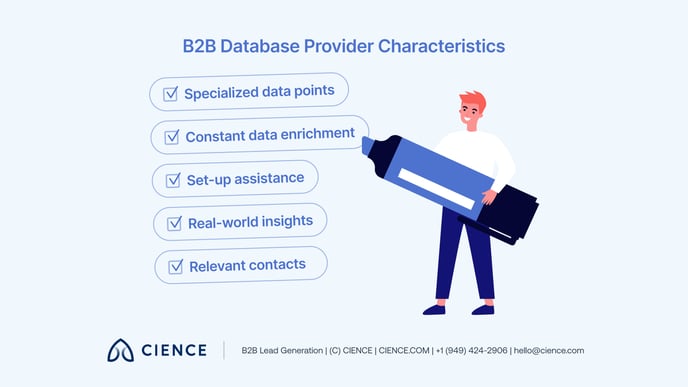Key Features to Try To Find When Choosing a Database Company
Picking a database carrier is a vital decision that can substantially impact your organization's operations and information monitoring technique. Among the important attributes to take into consideration are scalability alternatives, which guarantee that your system can adapt to growing demands. Safety actions, performance metrics, and client assistance also play pivotal functions in this evaluation procedure. As you weigh these variables, it comes to be apparent that the choice is not merely about performance but likewise concerning aligning with your long-lasting vision. What various other factors to consider might affect this crucial decision?
Scalability Options
When choosing a data source provider, recognizing scalability choices is vital to making certain that the chosen option can fit future growth. Scalability describes the capacity of a data source system to broaden its capacity and performance in feedback to increased demand. There are two primary sorts of scalability: vertical and horizontal.
Upright scalability, or "scaling up," involves boosting a single web server's resources, such as CPU, RAM, or storage space. This approach can be straightforward and cost-effective for smaller applications yet may get to a limitation where further upgrades are too expensive or impractical.
Straight scalability, or "scaling out," involves including more web servers to distribute the load. This method permits greater flexibility and can accommodate considerable rises in data volume and user web traffic (database provider). It is specifically advantageous for cloud-based data source services that can dynamically allot sources based upon need

Safety Steps

When examining safety steps, think about the implementation of encryption methods (database provider). Data-at-rest and data-in-transit security are vital to make certain that sensitive info continues to be safeguarded, also in case of a security violation. Furthermore, seek suppliers that offer solid verification systems, such as multi-factor verification (MFA), to additionally improve gain access to control
Normal protection audits and conformity with market criteria, such as GDPR or HIPAA, are indicative of a provider's dedication to information security. Moreover, ask about their incident reaction strategy; a durable strategy can reduce the impact of any kind of possible security event.
Efficiency Metrics
Evaluating efficiency metrics is important for companies to ensure that their selected data source carrier meets functional requirements. Key performance metrics consist of action throughput, time, and scalability, which collectively identify the effectiveness of database procedures under differing lots.
Response time is important, as it mirrors just how quickly the database can process inquiries and return results. Organizations should search for metrics that indicate average feedback times during height and off-peak hours. Throughput, typically measured in purchases per 2nd (TPS), offers understanding into the data source's capability to manage high volumes of demands without efficiency deterioration.
Scalability analyzes the database's capability to expand with the company's needs. A durable database carrier should demonstrate horizontal and vertical scaling capacities, enabling for seamless changes as needs change. Additionally, understanding latency, specifically in dispersed systems, can aid companies evaluate the responsiveness of the data source across different geographical locations.
Customer Assistance
Trustworthy customer support is a cornerstone of efficient data source monitoring, offering organizations with the assistance needed to solve issues and optimize performance. When picking a data source service provider, assessing the level of customer assistance they provide is crucial. A robust assistance system should consist of multiple networks of interaction, such as phone, email, and live chat, making sure that customers can access help whenever they require it.
Furthermore, receptive assistance teams that are offered 24/7 greatly enhance the reliability of the data source service. Trigger response times and efficient resolution of problems can dramatically lower downtime and increase general productivity. It is additionally advantageous to take into consideration the accessibility of specialized assistance workers, that can offer customized support based on a company's details demands.

Prices Framework
When taking into consideration a database provider, the pricing structure is a pivotal aspect that can significantly impact an organization's spending plan and general method. A versatile and clear prices model is essential for aligning the data source costs with service needs - database provider. Organizations must review whether the pricing is based on intake, per user, or a find more level price, as each model can great site produce various monetary implications with time
It is essential to analyze any kind of added costs related to the carrier's services, such as information storage fees, deal costs, and assistance costs. Some providers may supply tiered prices, permitting scalability as the company expands, while others might impose rigorous restrictions that might end up being costly as information needs boost.
In addition, organizations should take into consideration the long-lasting value of the database option. While lower first rates can be attractive, they might not make up future upgrades, upkeep fees, or integration prices. Conducting a detailed cost-benefit evaluation will certainly help identify one of the most appropriate rates framework that stabilizes scalability, assistance, and efficiency, eventually making certain that the picked data source carrier aligns with the company's monetary and functional purposes.
Final Thought
To conclude, selecting a database company necessitates mindful consideration of various critical functions. Scalability alternatives make sure adaptability to future development, while robust protection procedures protect sensitive info. Reviewing performance metrics enables the identification of effective databases, and available client assistance boosts the overall user experience. A clear rates structure even more adds to informed decision-making. By thoroughly assessing these elements, organizations can make tactical options that align with their long-term objectives and operational needs.
Picking a data source company is an essential choice that can considerably affect your organization's procedures and information monitoring method.When choosing a database supplier, recognizing scalability choices is important Learn More to ensuring that the picked solution can fit future growth. When picking a database carrier, examining the degree of customer support they provide is crucial.When thinking about a data source provider, the pricing framework is a pivotal element that can dramatically impact an organization's budget plan and total strategy. Carrying out a comprehensive cost-benefit evaluation will assist identify the most suitable prices structure that stabilizes support, efficiency, and scalability, eventually guaranteeing that the chosen database service provider straightens with the organization's economic and operational goals.